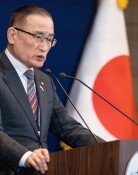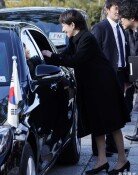The paradox of female protection act
The paradox of female protection act
Posted October. 10, 2013 07:16,
"Sweden caught two birds of increasing female employment and raising fertility rate by introducing the parental leave system": remarks by Rep. Lee Eon-joo of the main opposition Democratic Party. "Sweden gives 480 days of paid childrearing leave to ensure that women will not be ostracized from the labor market": Swedish Social Security Minister Ulf Kristersson. Hearing about Sweden, the country sounds like working mothers` heaven. The mother and father share the childrearing leave, with each of them required to use at least 60 days. This measure is meant to break the perception that childrearing is the mother`s responsibility.
More than 80 percent of fathers take paternity leave in Norway, a country that also boasts a well developed motherhood welfare system comparable to that of Sweden. However, there is one thing that has not gone up: The ratio of female corporate CEOs. Among the Fortune 500 companies as picked by the U.S. business magazine, the ratio of companies with females as CEO came to 2.4 percent in the U.S. but the ratio only stood at 1 percent in Sweden. The portion of executive-level officials at companies is also far lower in Northern Europe than the U.S. Why has such gender disparity occurred in Northern Europe, which is famous for gender equality?
The Research Institute of Industrial Economics (IFN) of Sweden announced the result of a study, suggesting, "A generous welfare system causes females to lag behind in elite competition." Women in Northern Europe mostly land jobs in the public sector, rather than highly competitive conglomerates. They are concentrated on female-friendly jobs such as teaching or social service, and lower middle management positions that enable them to "call it a day on time" or take flextime shifts. In contrast, private companies that inevitably engage in global competition employ fewer female staff, who take more leaves and entail more welfare expenses. This is the paradox of a "welfare state": the more advanced a country`s welfare system is, the higher its female employment ratio gets, but the fewer the number of females who are promoted to executive positions gets.
The ruling Saenuri Party and the Employment and Labor Ministry have agreed to expand the working mothers entitled to take childrearing leave from those with a child age six or under to those with a child with nine or under. The Korea Federation of Small and Medium Business is protesting the measure, saying, "The system will render it difficult (for companies) to hire female workers." The Korea Employers Federation also said, "It will add burden to companies and increase confusion." There are already many working mothers who cannot afford to take all of their legally available childrearing leave as they need due to concern over their job security, the new measure could only end up blocking females from landing jobs. Denmark is the only country in the world that grants childrearing leave to mothers with a child aged nine or under.
Editorial Writer Kim Soon-deok (yuri@donga.com)






![[사설]참 구차한 김병기 전 원내대표](https://dimg.donga.com/c/138/175/90/1/wps/NEWS/IMAGE/2026/01/13/133151454.1.jpg)
